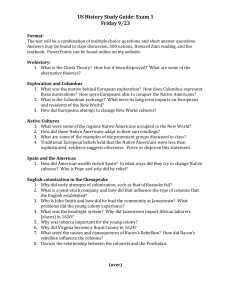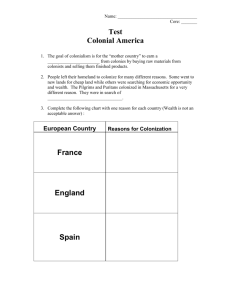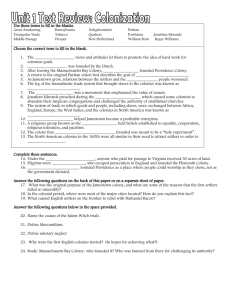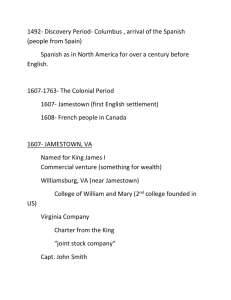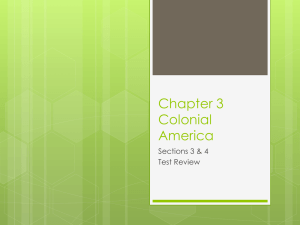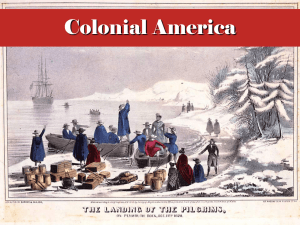WIKI Unit 01 Study Guide
advertisement
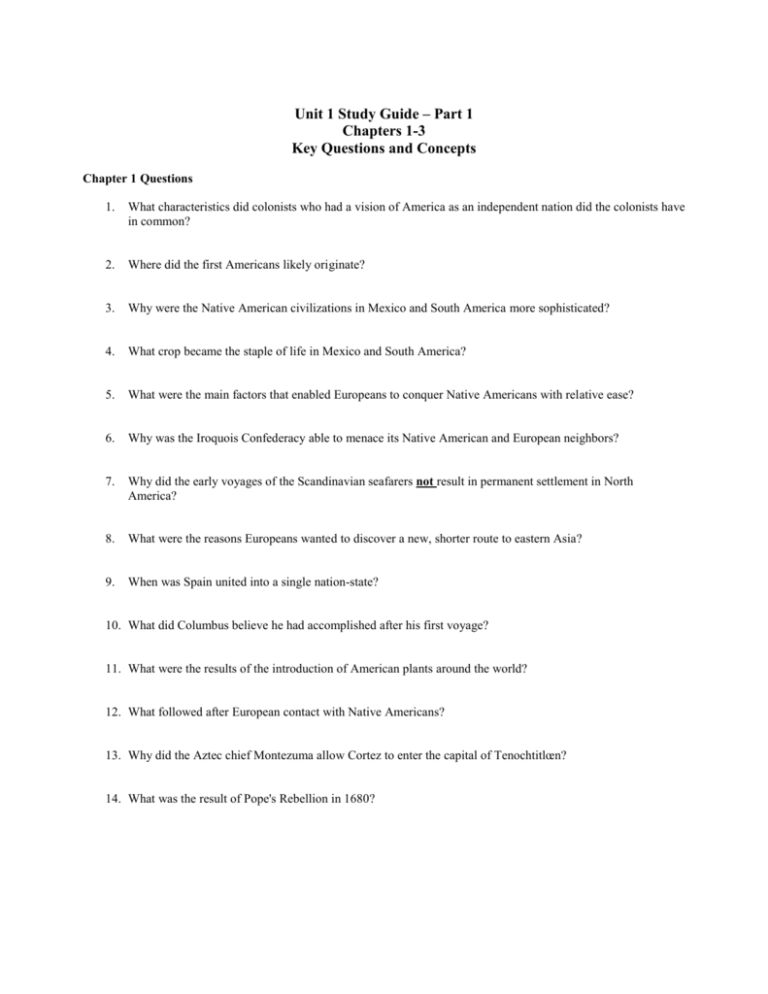
Unit 1 Study Guide – Part 1 Chapters 1-3 Key Questions and Concepts Chapter 1 Questions 1. What characteristics did colonists who had a vision of America as an independent nation did the colonists have in common? 2. Where did the first Americans likely originate? 3. Why were the Native American civilizations in Mexico and South America more sophisticated? 4. What crop became the staple of life in Mexico and South America? 5. What were the main factors that enabled Europeans to conquer Native Americans with relative ease? 6. Why was the Iroquois Confederacy able to menace its Native American and European neighbors? 7. Why did the early voyages of the Scandinavian seafarers not result in permanent settlement in North America? 8. What were the reasons Europeans wanted to discover a new, shorter route to eastern Asia? 9. When was Spain united into a single nation-state? 10. What did Columbus believe he had accomplished after his first voyage? 11. What were the results of the introduction of American plants around the world? 12. What followed after European contact with Native Americans? 13. Why did the Aztec chief Montezuma allow Cortez to enter the capital of Tenochtitlœn? 14. What was the result of Pope's Rebellion in 1680? Chapter 1 Key Concepts Understand the most important geological conditions that set the stage for North American history Account for the major Indian cultures of the Americas and explain there differences Explain the fundamental factors that drew Europeans to the exploration, conquest, and settlement of the New World. Know factors of Spanish colonialism particularly. Chapter 2 Questions 1. What was the result of England's defeat of the Spanish Armada? 2. England possessed what attributes on the eve of its colonizing adventure around 1600? 3. What did the guarantee that English settlers in the New World would retain the "rights of Englishmen" mean? 4. What characterized the early years of Jamestown colony? 5. How can the role Captain John Smith's at Jamestown best be described? 6. The result of the Second Anglo-Powhatan War in 1644 can best be described as 7. Why, after the purchases of slaves in 1619 by Jamestown settlers, were additional purchases of Africans rare? 8. What was the result of the cultivation of tobacco at Jamestown colony? 9. What were the reasons for the founding of Maryland colony? 10. How were slaves treated under the Barbados slave code of 1661? 11. Why did the colony of South Carolina prosper? 12. How were the inhabitants of North Carolina were regarded by their neighbors? 13. What best describes the attitude of Carolinians toward Indians? 14. Why was the colony of Georgia created? 15. Why, in American history, is 1619 in important date? Chapter 2 Key Concepts The similarities and differences of the southern colonies before 1733 The ways conflict between the English settlers and the Indians affected both parties Trace the development of the labor force used in the southern colonies Chapter 3 Questions Why did King James I oppose the Separatists who wanted to break away entirely from the Church of England? What was the historical significance of the Separatist Pilgrims at Plymouth? Why was Massachusetts Bay Colony successful so quickly? What were the major tenets of Puritan belief? People who flouted the authority of the Puritan clergy in Massachusetts Bay were subject to what punishments? What attributes made the colony of Rhode Island distinctive? Who settled the colony at New Haven? How would the Puritan efforts to convert Indians to Christianity after the Pequot War best be described? What was the result of King Philip’s War? What was the result of England’s Glorious Revolution? What characterized the Dutch colony of New Netherland (later New York)? What traits made the Quakers unpopular in England? How can the Indian policy in early Pennsylvania best be described? Which section of the American colonies was there the greatest internal conflict? Specifically, which were the New England colonies? Chapter 3 Key Concepts Account for the differences in motives for founding, social and political development of the New England and Middle Colonies How did England attempt to gain control over its colonies in the late 17th century and did its efforts largely fail? Explain the development of religious liberty in the American colonies. (Both Chapters 2 and 3) Compare the economic and social conditions of the early southern colonies with New England and the middle colonies.

